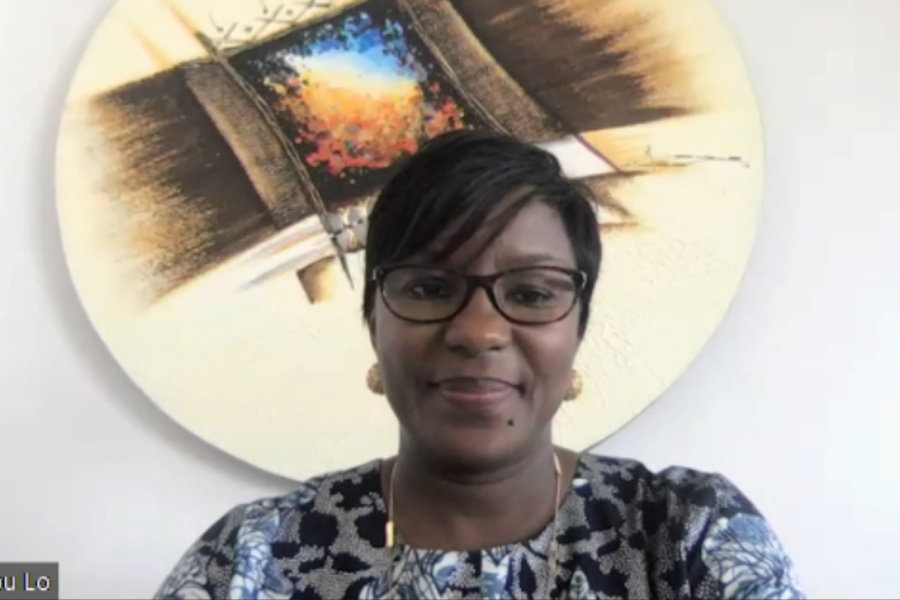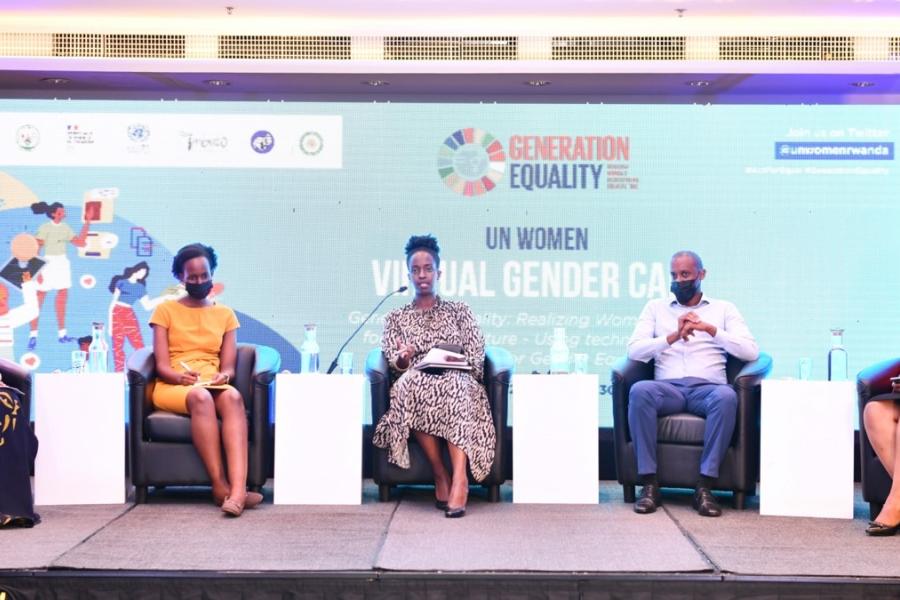Technology and Innovation for Gender Equality: UN Women Rwanda unveils the Youth potential ahead of Generation Equality Forum in Paris

In the lead up to the Generation Equality Forum, UN Women Rwanda emphasizes the importance of women’s full and effective participation in the ICT and STEM
In the lead up to the Generation Equality Forum in Paris, UN Women Rwanda emphasizes the importance of women’s full and effective participation in the ICT and STEM during its fifth Gender Café on the 17th of June, a head of the Generation Equality Forum slated for end of June hosted by President Emmanuel Macron together with several Heads of States and institutions from the public and private sector where they are expected to make high level commitments in support of gender equality and women’s empowerment. Under the theme of Realizing Women’s Rights for an Equal Future Using Technology and Innovation for Gender Equality, UN Women Rwanda hosted a panel discussion to discuss the importance of technology and innovation to foster gender equality which is one of the six Action Coalition of the GE campaignand co-led by the Government of Rwanda.
The café was regional with participation from the Eastern and Southern region. Due to the COVID-19 pandemic restrictions on large gatherings, a satellite station at FAWE career center gave an opportunity to a young girl with limited access to internet to follow the event live.
The Gender Café was well attended by partners from governments, civil society organizations, the private sector, development partners, youth, media, and academia. The Gender Cafés are quarterly platforms organized by UN Women and provides a space for dialogue, self-reflection and conversations on how to advance GEWE.
In her opening remarks, the UN Women Representative Fatou Lo acknowledged the efforts of the government and private sector in creating a conducive environment to harness technology towards achieving gender equality:
This is the most visionary platform for gender equality, highlighting the importance of engaging men and boys in shifting stereotypes. The coalition on technology and gender equality is in line with Rwanda’s vision to bridge the gender digital divide and we need all hands-on deck, women and men, boys and girls. We cannot continue to deepen the gender divide. The world cannot afford this. If we are to build back strong, inclusive, sustainable, and equitable societies and if we are to deliver on the promise of Beijing, of the SDGs and of Africa Agenda 2063.

As part of the Generation Equality campaign, UN Women launched a set of six Action Coalitions to accelerate action on critical thematic areas of concern. These are: Gender-Based Violence; Economic justice and rights; Bodily autonomy and sexual and reproductive health and rights (SRHR); Feminist action for climate justice; Technology and innovation for gender equality; and Feminist movements and leadership.
Launched in May 2019, Generation Equality is a multigenerational effort celebrating the 25th anniversary of the Beijing Platform for Action considered to this day to be the most visionary agenda for the empowerment of women and girls everywhere. Ms. Fatou reiterated in her remarks that, in an increasingly digitalized world where COVID-19 has challenged our development model to its core, greater efforts are needed to ensure that the digital gender divide is not further exacerbated and that women and girls are not left further behind in the fourth industrial revolution.
The Minister of State in charge of ICT & TVET, Hon. Claudette Irere in her remarks said that the government continues to ensure that more women are in leadership roles:
In our efforts to make sure that girls are accessing equal opportunities, we have over 23 all-girls schools that promote STEM subjects. 18% of female graduates are into science and the TVET sector, and we see a good number of girls taking up ICT- and STEM-related courses. We still have a long way to go to make sure women are skilled and have the right tools. We will ensure policies and strategies are put in place and are tackling the need present and ensuring that in the future such does not happen.
“…We need to take note of the societal barriers that different individuals face. Using technology and innovations of gender equality promote inclusivity and creates a platform to drive change”.

 The Gender Café had two main parts; a panel dialogue and a pitching session by eight young innovators presenting digital solutions that foster Gender Equality. The panel brought together experts in ICT and young leaders to discuss the issues of digitization, the challenges, and opportunities to tackle this gender gap and to raise awareness and support for innovative technical solutions that contribute to gender equality and to realizing women’s rights, which is what Generation Equality is all about.
The Gender Café had two main parts; a panel dialogue and a pitching session by eight young innovators presenting digital solutions that foster Gender Equality. The panel brought together experts in ICT and young leaders to discuss the issues of digitization, the challenges, and opportunities to tackle this gender gap and to raise awareness and support for innovative technical solutions that contribute to gender equality and to realizing women’s rights, which is what Generation Equality is all about.
“Some products are designed for women, but you find that women are not included in developing those products, so they end up not being relevant. It is only going to be a perfect product or solution when women are included,” Josephine Nyiranzeyimana, Government Chief Information Officer of Rwanda Information Society Authority (RISA).
Sangwa Rwabuhihi shares his experience in the innovation ecosystem and need for financing innovations and emphasized the role of men in closing inequalities in STEM fields:
“We can’t reach a gender-equal world if men who are in the field can’t use their privileges and voices to speak up about inequalities”.
In addition to the live panel, there was contributions from two young people including the Captain of the Rwanda Patriots Basketball Team, Aristide Mugabe who encouraged men to support and empower women to realize their dreams and Cleo Ingabire, a physicist who describes herself as “a young woman destined for greatness” who said that the 21st century is a world that is constantly changing, so being lifelong learners is going to be important. She encouraged youth to be adaptable and to use information available to positively change the world.
video https://www.youtube.com/watch?v=9X0HZQucyJ0&t=1s
The second segment highlighted the best practice innovative solutions that contribute to foster gender equality, followed by a pitching session by the eight below innovators:
- Dr. Edward LWIDIKO (ProjeKt Inspire) Tanzania, working on a solution to address the direct disconnect between current education and future employability especially conceptualizing a movement of young STEM professionals offering career guidance and inspiration to secondary school students.
- Abi Gaelle GISUBIZO (Keza 3D game) represented the Team Keza Game, an app that encourages positive attitudes and behavior towards ASRH, using a character named 'Keza'. This app is both entertaining and educational and aiming to reduce teenage pregnancies by providing accurate and timely information on ASRH.
- Orlyse INEZA (Humudity ZEN) worked on a system that stabilizes the humidity in a room to the optimization range of 60%-80%. This has a high potential to support small-holder women farmers by improving post-harvest management and reduce production losses, thus supporting increased income generation.
- Jacques MUCYURANYANA, has an SMS based tracking and reporting system of needs of persons with disabilities (PwDs). This is an impact-based social system sensitive for all types of disabilities that is currently being used by the National Council of Person with Disabilities in 3 districts: Kamonyi, Gatsibo and Kicukiro, with hope to scale country wide.
- Yvonne NYINAWUMUNTU (GoCook), an app that cconnects people to chefs who cook for them in the comfort of their homes. It is especially for those engaged in other demanding responsibilities with little or no time to cook. The business is also fostering Gender Equality by providing equal pay for equal work.
- Pascaline NIYONSABA (FloodWiz), a data visualization map that shows historical data on the damages caused by floods in Rwanda. This application is promising in relation to its contribution to women in climate smart agriculture and will assist government to make data-led decisions.
- Eric NIYONGIRA (Kundwa) is a computer typing application designed by three medical students to avail educative, evidence-based adolescent sexual & reproductive health (ASRH) and comprehensive sexuality education (CSE) information to all adolescents and youths in a friendly manner, with priority to youths living with disabilities.
- Ernest NSHIMIYIMANA (Affordable Smart Wheelchair for physical impairment) is an automated wheelchair that is geared towards improving movement for people with disabilities and elderly people who can’t move easily especially breastfeeding mothers living with disabilities.
 Closing the Gender Café, Anne Shongwe Githuku, the UN Women South African Representative, said that it is exciting how technology makes us look for long term solutions for our problems. We should think of how we can properly use technology to change the game for everyone: girls, women, and men.
Closing the Gender Café, Anne Shongwe Githuku, the UN Women South African Representative, said that it is exciting how technology makes us look for long term solutions for our problems. We should think of how we can properly use technology to change the game for everyone: girls, women, and men.
“2030 is what we call the expiration date to archive gender equality. How do we use the tech innovations to change the game in gender? As you ask yourself what to do next, also ask yourself about your commitment (Anne Shongwe Githuku).”
video of innovators https://www.youtube.com/watch?v=Etm1Qkrxr0s&t=3s
For more information, the Gender Café was live on YouTube.




